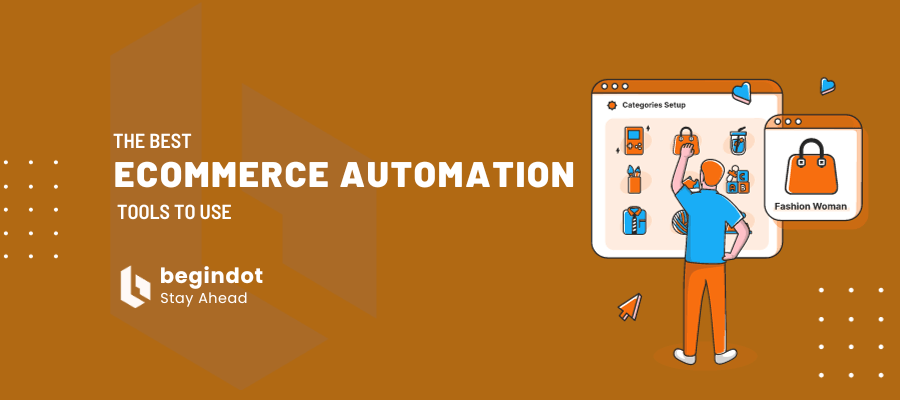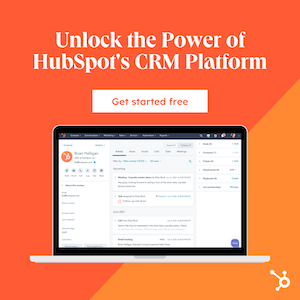In the fast-paced world of eCommerce, automation is no longer a luxury; it’s a necessity. Automating various aspects of your online store can save you time, reduce errors, and ultimately boost your profits.
The eCommerce landscape is evolving rapidly, and staying ahead of the competition means utilizing the most efficient tools available.
In this article, we’ll explore the top eCommerce automation tools, and how they can help your business to grow faster.
We’ll delve into other powerful automation tools like ShipStation, Yotpo, Zapier, CartFlows, Keap, CartHook, Klaviyo, MailChimp, Buffer, AutomateWoo, Shopify, Quickbooks, and more.
Top eCommerce Automation Tools
1. SureTriggers
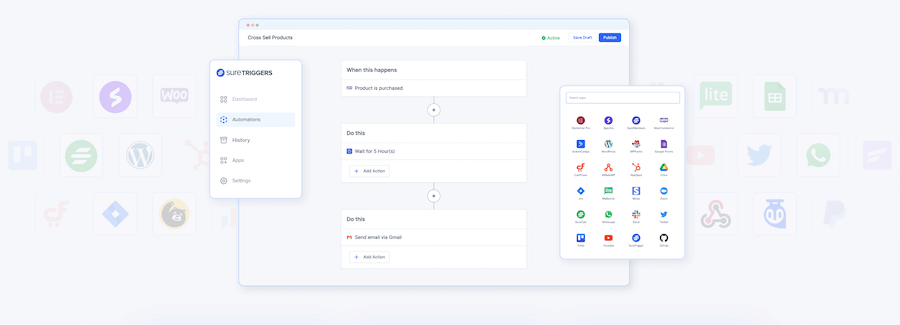
SureTriggers is the ultimate eCommerce automation tool, revolutionizing the industry. With its unmatched capabilities, it optimizes every aspect of your online business, propelling you to success.
It empowers you to automate and customize your eCommerce operations like never before.
Seamlessly integrate multiple apps, sync data, and create intricate workflows, all tailored to your unique needs. Its intuitive interface simplifies the automation process, even for beginners.
SureTriggers secret sauce lies in its ability to adapt. It offers dynamic conditional logic, enabling your store to respond intelligently to changing market conditions.
Never miss a beat with real-time error handling and notifications, ensuring smooth operations around the clock.
Key Features of SureTriggers:
- Multi-App Integration: Seamlessly connect various eCommerce platforms, payment gateways, and marketing tools to centralize data and streamline operations.
- Customizable Workflows: Design tailored automation flows to manage tasks like order processing, inventory updates, and customer notifications with precision.
- Real-time Sync: Ensure your data is always up-to-date across all integrated systems, providing a seamless shopping experience for customers.
- Inventory Management: Automatically adjust stock levels, trigger restocking alerts, and manage product listings to prevent overselling or stockouts.
- Customer Engagement: Personalize communication with automated emails, SMS notifications, and abandoned cart reminders to boost customer retention.
- Order Processing: Automate order fulfillment, shipping label generation, and tracking updates, reducing manual effort and speeding up delivery times.
2. ShipStation
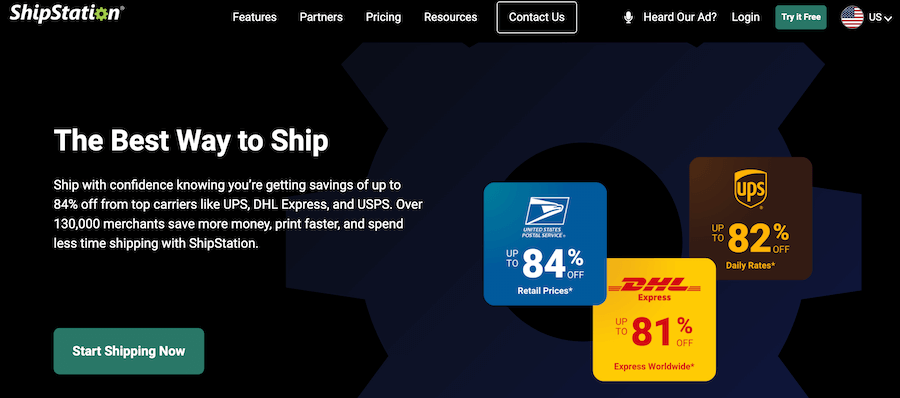
ShipStation is a robust eCommerce automation tool that simplifies and streamlines shipping processes for online businesses.
With support for multiple shipping carriers, it enables users to compare rates, print labels in bulk, and provide customers with real-time order tracking.
This platform is essential for improving the efficiency of eCommerce fulfillment, reducing shipping-related hassles, and ensuring timely deliveries, all of which contribute to a seamless shopping experience and increased customer satisfaction.
Key Features of ShipStation:
- Multi-Carrier Support: Easily compare and choose from multiple shipping carriers to find the best rates and options.
- Order Tracking: Provide customers with real-time tracking information, reducing inquiries and improving the overall shopping experience.
- Batch Printing: Print shipping labels and packing slips in bulk, streamlining your fulfillment process.
- Returns Management: Simplify the returns process with automated return labels and streamlined communication.
ShipStation is a game-changer for eCommerce businesses looking to optimize their shipping operations.
3. Yotpo
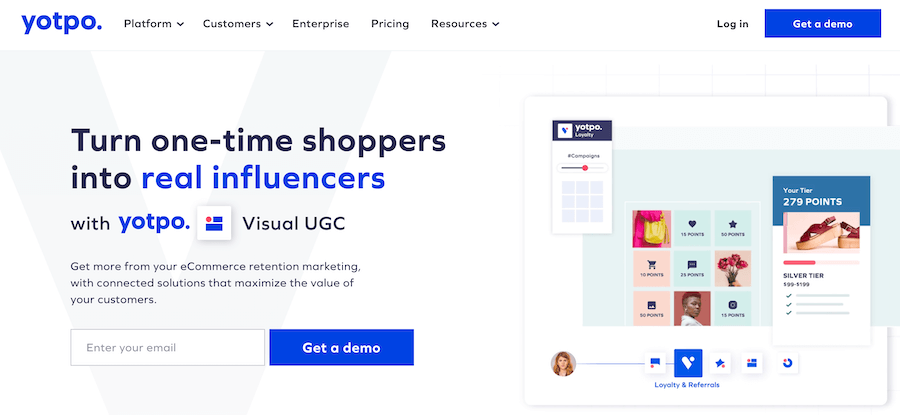
Yotpo is a powerful marketing automation platform designed to elevate customer engagement and boost online sales.
It specializes in collecting and showcasing user-generated content like product reviews, photos, and videos, providing valuable social proof for eCommerce businesses.
With features such as behavioral tracking and segmentation, Yotpo allows businesses to create highly targeted and personalized marketing campaigns.
By harnessing the voice of their customers, businesses can build trust, drive conversions, and foster brand loyalty, making Yotpo an invaluable tool in the competitive world of online retail.
Key Features of Yotpo
- Product Reviews: Yotpo facilitates the collection and display of user-generated product reviews, enhancing credibility and trust in your eCommerce store. Automated review request emails prompt customers to share their feedback, providing valuable social proof.
- Visual User-Generated Content (UGC): Yotpo encourages customers to contribute visual content such as photos and videos alongside reviews, creating a dynamic and engaging shopping experience.
- Social Media Integration: Yotpo allows you to seamlessly share customer reviews and UGC on various social media platforms, amplifying your brand’s reach and engagement.
- Behavioral Tracking: This feature enables businesses to track customer behavior and preferences, allowing for the creation of highly targeted and automated marketing campaigns based on user actions.
- Segmentation: Yotpo’s segmentation tools help eCommerce businesses categorize their customer base for personalized marketing efforts. This segmentation can be based on factors like purchase history, location, and engagement level, ensuring that each customer receives relevant and timely communications.
4. Zapier
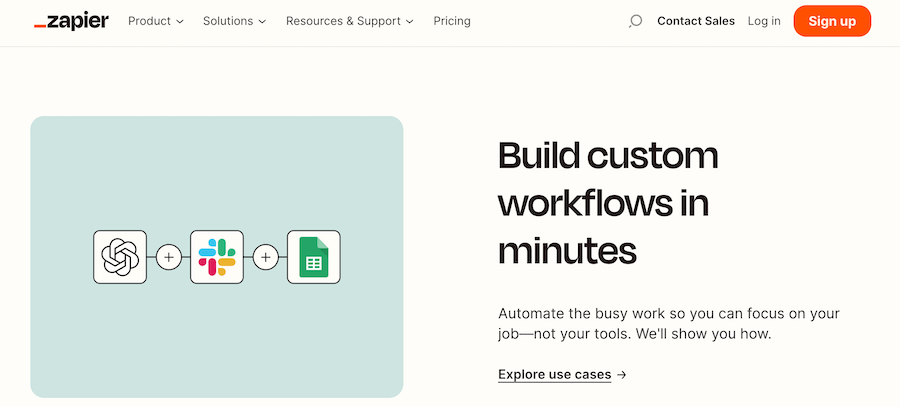
Zapier is a versatile online automation tool that connects your favorite apps, allowing them to work together seamlessly.
With over 3,000 supported apps, Zapier enables users to create automated workflows, known as “Zaps,” which trigger actions when specific events or conditions occur.
This automation tool simplifies repetitive tasks and data transfers, streamlining processes across various platforms and saving time.
Whether you’re managing email marketing, CRM, or eCommerce, Zapier empowers you to integrate and automate your tech stack, making it an invaluable tool for enhancing efficiency and productivity in both personal and professional settings.
Key Features of Zapier
- Multi-App Integration: Zapier connects with over 3,000 apps, including popular eCommerce platforms like Shopify and WooCommerce, allowing you to create seamless workflows and automate various processes within your eCommerce ecosystem.
- Automation Workflows: With Zapier, you can build custom automation workflows, or “Zaps,” that trigger actions based on specific events. For eCommerce, this means you can automate tasks like order processing, inventory management, and customer communication.
- Event-Based Triggers: Zapier offers event-based triggers, ensuring that your automation actions are responsive and occur in real-time. For instance, you can set up Zaps to send order confirmation emails immediately after a purchase is made.
- Data Synchronization: Keep your data up-to-date across different apps and platforms. For eCommerce, this means that changes in inventory levels, customer data, and order statuses can be automatically synchronized without manual intervention.
- Customization and Scalability: Zapier is highly customizable, allowing you to tailor your automation to suit your specific eCommerce needs. It’s also scalable, so as your business grows, you can add more Zaps to handle increased automation requirements without a hitch.
Zapier is your go-to solution for integrating and automating your entire eCommerce ecosystem.
5. CartFlows
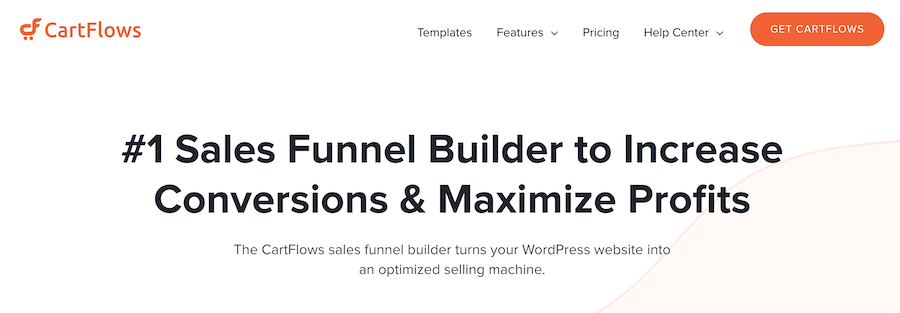
CartFlows is a WordPress plugin designed to optimize sales funnels for eCommerce businesses.
It simplifies the creation of high-converting, customizable sales funnels, making it easier to guide potential customers from product discovery to checkout.
With a user-friendly drag-and-drop builder, CartFlows allows you to design and fine-tune your funnel pages, including checkout pages, upsell offers, and thank-you pages.
Its A/B testing and analytics features enable you to continually refine your funnels for maximum conversion rates, making CartFlows an essential tool for improving sales and revenue in the world of online commerce.
Key Features of CartFlows
- Drag-and-Drop Funnel Builder: CartFlows offers an intuitive, user-friendly interface for creating and customizing sales funnels. With drag-and-drop functionality, you can design your funnels to match your branding and product offerings seamlessly.
- Checkout Page Optimization: Optimize your checkout pages for higher conversions with CartFlows. You can A/B test different layouts and elements to determine the most effective design for your specific audience.
- One-Click Upsells: CartFlows allows you to offer relevant upsell and cross-sell products with just one click during the checkout process. This feature helps increase the average order value and boost revenue.
- Analytics and Reporting: Gain insights into your funnel performance with built-in analytics and reporting tools. Track conversion rates, revenue generated, and user behavior to make data-driven improvements.
- Integration Capabilities: CartFlows seamlessly integrates with popular eCommerce platforms like WooCommerce and WordPress, as well as various payment gateways and marketing tools. This ensures that your entire eCommerce ecosystem works harmoniously to automate sales and marketing processes.
6. Keap (formerly Infusionsoft)
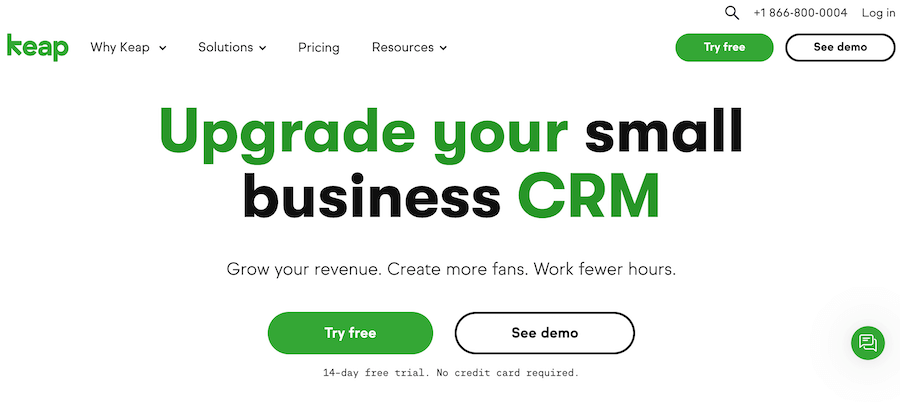
Keap, formerly known as Infusionsoft, is an all-in-one CRM (Customer Relationship Management) and marketing automation platform designed to help businesses streamline their customer interactions and marketing efforts.
It provides tools for contact management, lead tracking, and automated marketing campaigns.
Keap allows businesses to create personalized email marketing, manage sales pipelines, and automate various tasks, such as follow-ups and lead nurturing.
This comprehensive platform aims to simplify customer relationship management and marketing automation, enabling businesses to nurture leads into loyal customers and grow their revenue more efficiently.
Key Features of Keap
- Contact Management: Keap helps eCommerce businesses organize and segment their customer and lead lists, making it easier to personalize marketing efforts and communications based on customer behavior and preferences.
- Automated Marketing Campaigns: Keap allows you to set up and automate email marketing campaigns, including drip campaigns, abandoned cart recovery emails, and product recommendations, all designed to boost sales and customer engagement.
- E-commerce Integration: Keap seamlessly integrates with various eCommerce platforms, enabling businesses to track sales, customer data, and inventory levels. This integration ensures that marketing efforts are informed by real-time sales data.
- Lead Nurturing: Keap’s automation features make it easy to nurture leads through the sales funnel. You can automate follow-up emails and messages, ensuring that potential customers receive timely and relevant communications.
- Customized Workflows: Keap empowers businesses to create customized automation workflows that align with their specific eCommerce goals. This includes setting triggers and actions based on customer interactions, further enhancing the efficiency of marketing and sales processes.
Keap simplifies your marketing efforts and helps you nurture leads into loyal customers.
7. CartHook
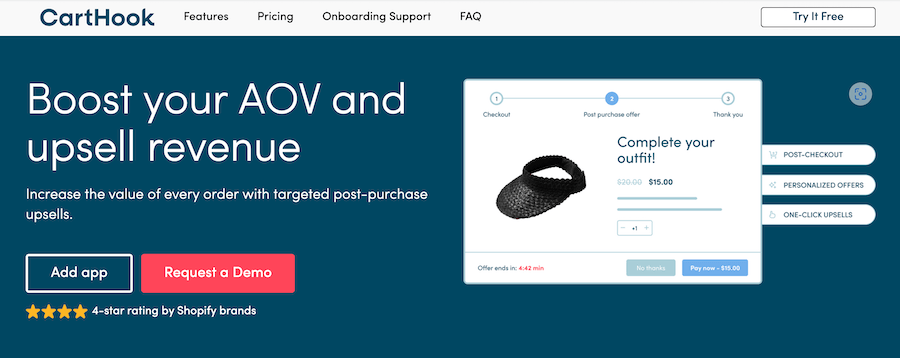
CartHook is an eCommerce optimization platform designed to enhance the cart and checkout experience for online stores.
It offers customizable and conversion-focused cart pages, post-purchase upsells, and one-click order bumps.
This tool helps eCommerce businesses reduce cart abandonment rates by providing a smoother and more attractive purchasing process.
By offering exit-intent offers and streamlining the checkout process, CartHook boosts conversion rates, maximizes revenue, and provides valuable insights to improve the overall shopping experience for customers, making it an indispensable tool for online retailers.
Key Features of CartHook
- Customizable Cart Pages: CartHook allows you to design and optimize your cart pages for better conversions. You can customize the layout, colors, and content to align with your brand and improve the shopping experience.
- Exit-Intent Offers: Reduce cart abandonment rates with exit-intent offers. CartHook enables you to display targeted discounts or incentives to users who are about to leave your site, encouraging them to complete their purchase.
- Post-Purchase Upsells: Boost your average order value by offering relevant upsell products immediately after a successful purchase. CartHook simplifies the process of suggesting additional items to customers, increasing revenue per transaction.
- Analytics and Insights: Gain valuable insights into your cart and checkout performance with CartHook’s analytics tools. Monitor conversion rates, track revenue, and assess the effectiveness of your exit-intent offers and upsells.
- Integration with Ecommerce Platforms: CartHook seamlessly integrates with popular eCommerce platforms like Shopify and WooCommerce. This ensures that your cart and checkout processes are automated and optimized within your existing eCommerce ecosystem, reducing manual work and improving efficiency.
CartHook is a game-changer for eCommerce stores looking to recover lost revenue and optimize their cart experience.
8. Klaviyo

CartHook is an eCommerce optimization platform designed to enhance the cart and checkout experience for online stores.
It offers customizable and conversion-focused cart pages, post-purchase upsells, and one-click order bumps. This tool helps eCommerce businesses reduce cart abandonment rates by providing a smoother and more attractive purchasing process.
By offering exit-intent offers and streamlining the checkout process, CartHook boosts conversion rates, maximizes revenue, and provides valuable insights to improve the overall shopping experience for customers, making it an indispensable tool for online retailers.
Key Features of Klaviyo
- Behavioral Tracking: Klaviyo tracks customer behavior on your eCommerce site, allowing you to segment your audience based on their interactions. This data can be used to send highly personalized and relevant email campaigns.
- Segmentation: Klaviyo offers powerful segmentation tools, enabling you to categorize your email list into specific groups based on factors like purchase history, browsing behavior, and demographics. This segmentation ensures that your email marketing is targeted and effective.
- Automated Flows: Klaviyo allows you to set up automated email flows, such as cart abandonment emails, welcome series, and product recommendations. These automated sequences engage customers at critical points in their journey, boosting conversion rates and customer retention.
- A/B Testing: Klaviyo’s A/B testing feature enables you to experiment with different email subject lines, content, and designs to determine which elements are most effective in driving opens, clicks, and conversions.
- Analytics and Reporting: Klaviyo provides detailed analytics and reporting tools that help you monitor the performance of your email campaigns. Track key metrics like open rates, click-through rates, revenue generated, and customer engagement to continuously refine and improve your email marketing strategy.
Klaviyo helps you deliver the right message to the right customer at the right time, increasing your email marketing ROI.
9. MailChimp
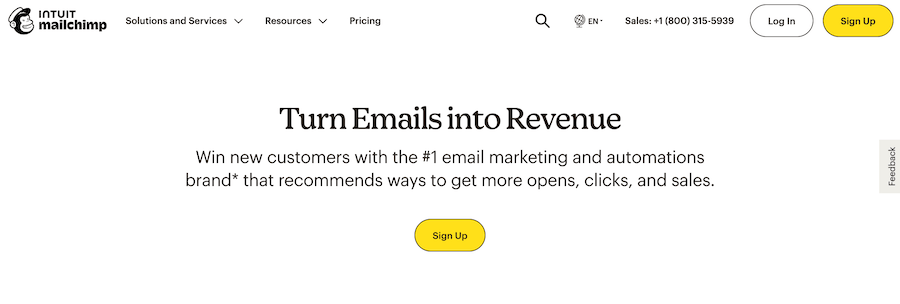
MailChimp is a versatile email marketing platform with a focus on eCommerce automation. It empowers online retailers to create, send, and automate email campaigns with ease.
With features like segmentation, product recommendations, and automated flows, MailChimp enables eCommerce businesses to send personalized messages to their customers based on their behaviors and preferences.
This automation tool simplifies marketing efforts, enhances customer engagement, and drives revenue growth by delivering timely and relevant emails, making it a valuable asset in the eCommerce world.
Key Features of MailChimp
- Email Campaign Automation: MailChimp allows you to automate your email marketing campaigns, from welcome emails to abandoned cart reminders and post-purchase follow-ups. This ensures that customers receive timely and relevant messages throughout their journey.
- Segmentation: MailChimp’s robust segmentation capabilities enable you to divide your email list into specific groups based on criteria like purchase history, browsing behavior, and demographics. This allows for highly targeted and personalized marketing efforts.
- Product Recommendations: MailChimp can automatically generate product recommendations for individual customers based on their past purchases and browsing behavior. This feature helps increase cross-selling and upselling opportunities.
- A/B Testing: You can conduct A/B tests on various elements of your emails, such as subject lines, content, and send times, to determine which strategies yield the best results and optimize your email campaigns accordingly.
- Analytics and Reporting: MailChimp provides detailed analytics and reporting tools, allowing you to track email performance, conversion rates, revenue generated, and customer engagement. These insights help refine your email marketing strategy for better results in eCommerce.
MailChimp is a versatile tool for eCommerce businesses of all sizes, offering both simplicity and advanced features.
10. Buffer
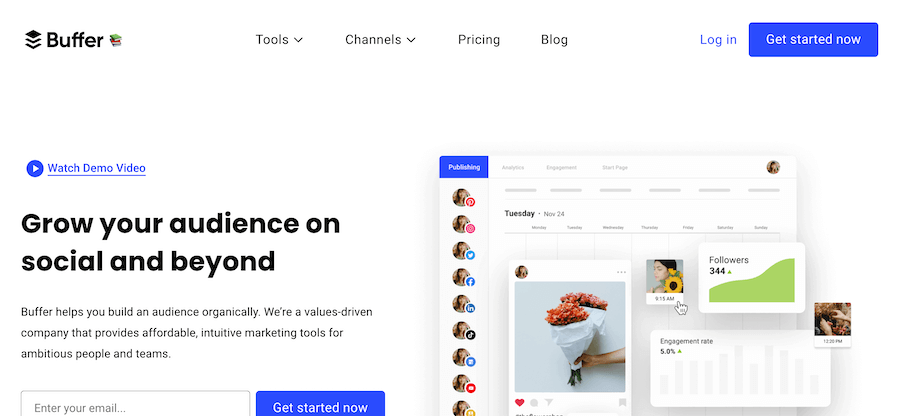
Buffer is a social media automation tool tailored for eCommerce businesses.
It simplifies the process of managing and scheduling posts across various social media platforms.
With Buffer, online retailers can plan their social media content in advance, ensuring a consistent online presence.
It offers features like analytics, team collaboration, and post-scheduling, helping eCommerce businesses automate their social media marketing efforts.
By automating social media posting, Buffer allows brands to maintain an active and engaging online presence, drive traffic to their eCommerce sites, and boost their overall marketing efficiency.
Key Features of Buffer:
- Scheduling and Publishing: Buffer allows eCommerce businesses to schedule and publish social media posts in advance, ensuring a consistent and timely online presence across platforms like Facebook, Instagram, and Twitter.
- Multi-Platform Management: Buffer supports multiple social media platforms, making it easy for businesses to manage and automate their social media marketing efforts across various networks.
- Analytics and Insights: Buffer provides analytics tools to track the performance of social media posts. This data helps eCommerce businesses assess which content is most effective in driving engagement and traffic to their online stores.
- Team Collaboration: Collaboration features enable teams to work together on social media strategies and content scheduling, streamlining the process and ensuring a cohesive brand presence.
- Customizable Schedules: Buffer allows you to create custom posting schedules tailored to your audience’s most active times, maximizing the reach and impact of your social media posts.
Buffer ensures your brand stays active and engaged on social media without the hassle of manual posting.
11. AutomateWoo
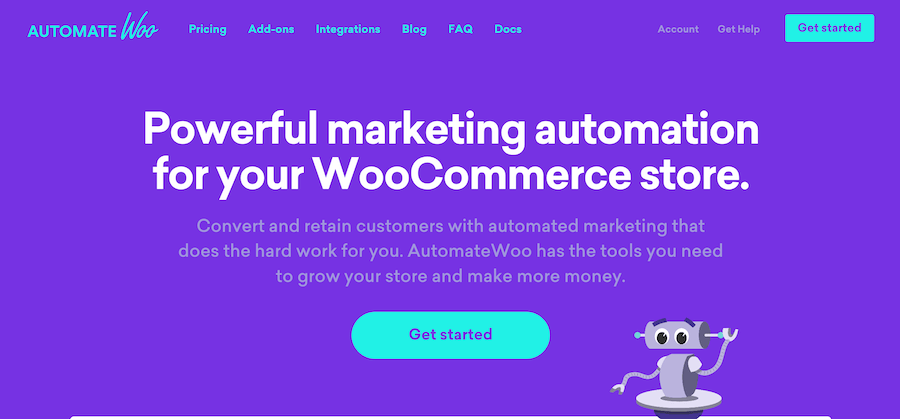
AutomateWoo is a powerful eCommerce automation plugin, designed specifically for WooCommerce, that streamlines and enhances various aspects of online stores.
It offers a wide range of automation features, including cart abandonment recovery, personalized follow-up emails, dynamic pricing rules, and subscription management.
By automating these tasks, AutomateWoo helps eCommerce businesses improve conversion rates, boost customer retention, and optimize their WooCommerce stores for better overall performance.
It simplifies complex processes and ensures a seamless shopping experience for customers, making it an invaluable tool for WooCommerce-based online retailers.
Key Features of AutomateWoo
- Cart Abandonment Recovery: AutomateWoo allows you to send automated cart abandonment emails to customers who have left items in their carts, enticing them to complete their purchases and recover potentially lost sales.
- Follow-Up Emails: Create customized follow-up email sequences based on customer behavior, such as post-purchase thank-you emails, product recommendations, and feedback requests, to improve customer engagement and retention.
- Dynamic Pricing Rules: Set up dynamic pricing rules to offer discounts or incentives to specific customers or segments, encouraging higher-value purchases and increasing average order values.
- Subscription Management: Automate subscription-related processes, including renewal reminders, payment processing, and subscription status updates, for a smoother and more efficient subscription-based eCommerce model.
- Integration with WooCommerce: AutomateWoo seamlessly integrates with WooCommerce, the popular WordPress eCommerce plugin, ensuring that your eCommerce automation efforts are tightly integrated with your online store for a unified and automated customer experience.
AutomateWoo enhances your WooCommerce store’s functionality, providing a competitive edge.
12. Shopify

Shopify is a comprehensive eCommerce platform known for its exceptional eCommerce automation capabilities.
It empowers businesses to create and manage online stores efficiently. With features like inventory management, order processing, and automated email marketing, Shopify streamlines various eCommerce tasks.
It also offers a wide range of integrations and apps that automate tasks such as product recommendations, abandoned cart recovery, and customer support.
Shopify enables businesses to automate essential processes, enhance customer experiences, and drive sales growth, making it a go-to choice for eCommerce automation and management.
Key Features of Shopify
- Inventory Management: Shopify automates inventory tracking, ensuring that product levels are always up-to-date. When stock reaches predefined thresholds, the platform can notify you or even automatically reorder products.
- Order Processing: Streamline order processing with automation tools that generate packing slips, shipping labels, and order confirmations. You can also set up automated order status updates for customers.
- Abandoned Cart Recovery: Shopify offers automated abandoned cart recovery emails to remind customers about their unfinished purchases, helping recover potentially lost sales.
- Product Recommendations: Leverage Shopify’s automated product recommendation tools to suggest related or complementary products to customers, increasing the average order value.
- Email Marketing Automation: Shopify’s built-in email marketing features allow for automation of email campaigns, including welcome emails, product recommendations, and post-purchase follow-ups, enhancing customer engagement and retention.
Shopify is an all-in-one solution that simplifies the entire eCommerce process, from setting up your store to managing orders and marketing.
13. QuickBooks

Quickbooks is an automated accounting software that simplifies financial management for eCommerce businesses.
It seamlessly integrates with online stores and automates various accounting tasks, such as expense tracking, invoicing, and financial reporting.
Quickbooks ensures that financial data is accurate and up-to-date, making tax preparation and compliance effortless.
By automating financial processes, Quickbooks allows eCommerce businesses to focus on growth, reduce manual errors, and maintain financial transparency, making it an essential tool for efficient financial management in the eCommerce sector.
Key Features of Quickbooks
- Expense Tracking: QuickBooks automates the tracking of expenses, allowing eCommerce businesses to categorize and organize expenditures for accurate financial records.
- Invoicing: Automated invoicing features streamline the creation and sending of invoices to customers, making it easier to manage cash flow and payments.
- Integration with Ecommerce Platforms: QuickBooks integrates seamlessly with popular eCommerce platforms, ensuring that sales and financial data are automatically synchronized for efficient accounting.
- Inventory Management: QuickBooks can automate inventory tracking, providing real-time insights into stock levels and helping prevent overselling or stockouts.
- Financial Reporting: QuickBooks generates automated financial reports, such as profit and loss statements and balance sheets, providing a clear overview of the eCommerce business’s financial health and aiding in decision-making.
Quickbooks helps you keep your eCommerce finances organized and up-to-date, ensuring compliance and accurate financial reporting.
Other Noteworthy Automation Tools for Ecommerce
While we’ve highlighted some of the top automation tools for ecommerce, there are many more worth exploring.
Tools like Trello for project management, OptinMonster for lead generation, and Zendesk for customer support automation can also enhance your online business operations.
Be sure to assess your specific needs and explore the automation solutions that best align with your ecommerce goals.
Conclusion
As ecommerce continues to evolve, staying competitive means embracing automation.
Whether you’re looking to enhance your customer engagement, streamline your shipping process, optimize your sales funnel, or automate your marketing efforts, there’s a tool for you.
SureTriggers, Zapier, Shopify and AutomateWoo are some of our top picks, offering a comprehensive solution that covers various aspects of ecommerce automation.
However, each tool on this list serves a specific purpose and can contribute to the success of your online store.
Evaluate your unique requirements, and consider integrating these automation tools into your ecommerce strategy to drive efficiency, improve customer satisfaction, and ultimately increase your revenue.

